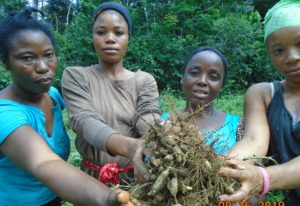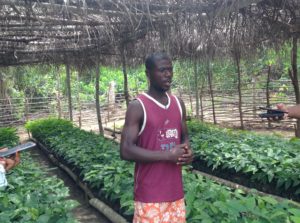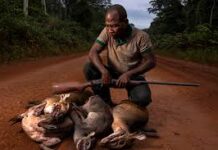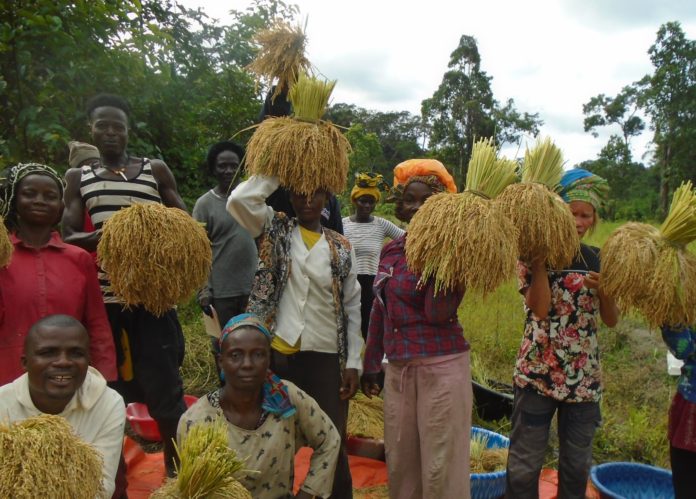Considering the range of forest Liberia holds in the upper Guinea basin, Bilateral and Multilateral institutions have taken serious interest in supporting projects and programs that would engender Sustainable Forest Management and behavior change pattern around Forest set aside by the Government and people of Liberia to be administered as a National Park.
One of such institutions is the United States Agency for International Development (USAID) which is funding the West Africa Biodiversity Climate Change project with the aim of sustainably managing the Gola Forest trans-border landscape.
The project being implemented by the Society for the Conservation of Nature of Liberia through the Vainga Agriculture Development and Management Consultancy (VADEMCO) had trained hundreds of traditional farmers, hunters and miners in different skills, including modern agriculture, Beekeeping, Business Management, among others.
The provision of the new skills to the traditional farmers, hunters and miners is to stimulate behavior change around the Gola Forest National Park and empowered them to do cocoa, rice and bee farming and how to manage their own money from sales of their businesses.
A beneficiaries who is a rice farmer in Green-Bar City around the Gola Forest National Park, Joe Dahn said the traditional farming method which they applied before the intervention of the USAID-funded WABICC project inflicted so many suffering on them because they were using strength to fall forest trees using axe.
“The project give us the understanding on how we can go to low land farming and how we can use less labor when we are farming” Mr. Dahn said.
“For me I underwent training in modern rice and groundnut production and since I learn this new method I have been producing rice and groundnut with less labor and I no longer go into the forest for farming or hunting”.
“On behalf of my people I want to appeal to those that bring this project for us to please bring goats, chicken and pigs for us to raise them so that we can avoid hunting bush meat”,Mr. Dahn said.

“The project is good and is surely helping us but if we get these cattle we will be very much happy and we will help other communities”.
“When SCNL and VADEMCO came with this project at first we were against it but today we have understand the project so we have long started making use of the it by planting cocoa, rice, groundnut, and keeping bee and we enjoying them”.
Like Joe Dahn Mr. Boakai Kamara, a rice farmer in Korllah Village spoke of the impact that the WABICC project had brought to them and continue to play in their lives along with neighboring community members and his family.
Mr. Kamara, 39 said project is benefiting five villages including Korllah, Ndormallah, London, and Patrick Village. The people from the five villages were placed into various groups where each of the groups was trained to develop plots to plant rice and groundnut.
He said since the training was imparted into them they have heavily reduced their dependency on the forest for livelihood and other activities.
Improved new skill for income generation

In Fula camp, dozens of people mentioned that the project is set to change their way of farming and hope that the new method and skills acquired from SCNL and VADEMCO under the USAID funded WABICC project will help them generate income to support their livelihood activities.
Under the project cocoa farmers have been trained in modern cocoa intensification and maintenance. Additionally, others were trained as Bee farmers, rice and groundnut farmers.
LRD$12,000.00 constituting US$64.00 each was initially given to a group of 50 women to jump start petty business under the small loan component of the project. The loan to the women is aimed at empowering them to carter for their family.
It also creates a platform where the women will use their resources to discourage their husbands some of whom are commercial bush-meat hunters and miners to abandon hunting and mining and go into other livelihood activities.
Some of the beneficiaries are Marka Perry, Aaron Peter, Omie Kiemie, Oretha Kotu, Joe Myers, Morris Moiklee, Moses Dennis, Jebbeh Gonkernue, among others.
Fula camp is also paired with other communities which include Gbandi ,Soso Camps and Green-Bar City. Beneficiaries of the project have organized themselves into Corporative called the Sokpo Multipurpose Farmer Cooperative (SOMUFA) to continue their engagement in the absence of the WABBIC project.
“We have over 150 registered members with 64 shareholders, our leadership structures are already in place”, said Jerry Kerkulah Secretary General of the cooperative is He said their cooperative is prepared to work with farmers in the area to ensure that each of them realize income from their cocoa produce.
Replacing Mining with agriculture
Mining remains a conduit of attraction for most young people around the Gola Forest but since the intervention of the WABICC project most of them are gradually developing interest in cocoa farming because it also serves as a means for long term income for them.
Water sources around the Gola Forest are experiencing serious pollution due to the magnitude of mining activities in the area. Inhabitants are said to be facing extreme problem to fetch traveling 15 minutes distance for safe and clean drinking water.
Mining, hunting and traditional farming had been the only sources of living for the locals.
The challenge to disabuse the minds youths of Fula Camp and surrounding communities from mining remains a struggle for conservation partners in Grand Cape Mount, but Morris Moikie, a facilitator of the cocoa farmer field school says he believe young people can generate income beside mining.
Morris who is now a cocoa nursery owner maintained that cocoa farming is one thing that will help reduce mining activities in the community.
Morris said: “Two to three years from now I’ll generate money from my cocoa farm still, but with mining, mineral can finish”, he adds.






















